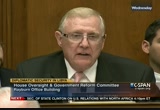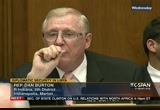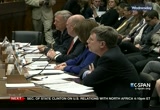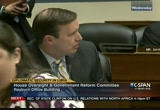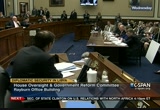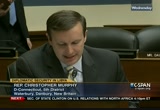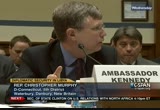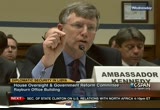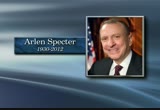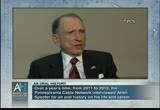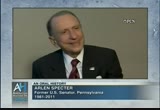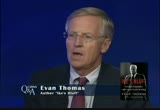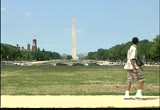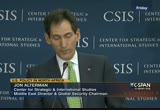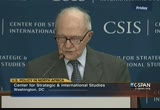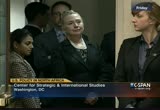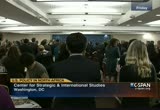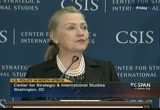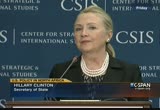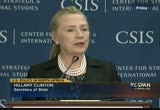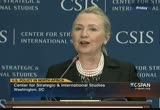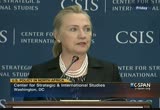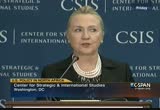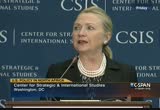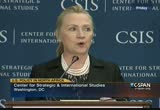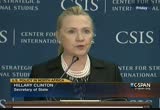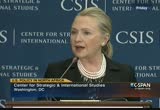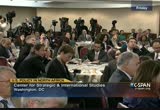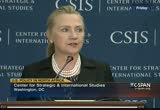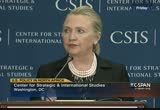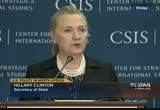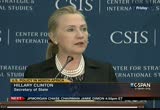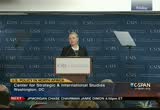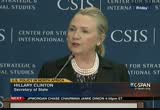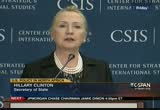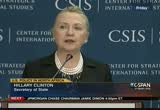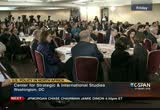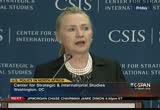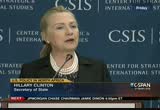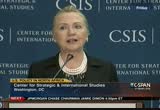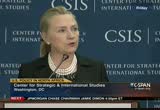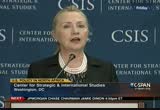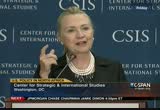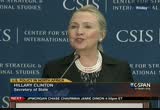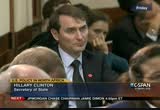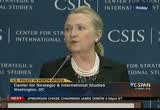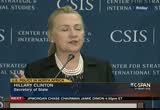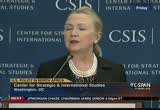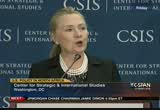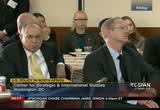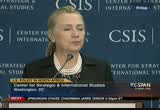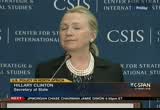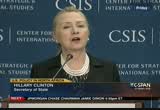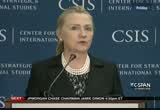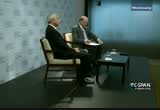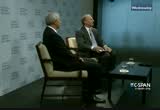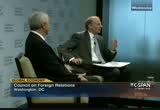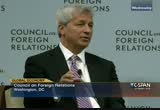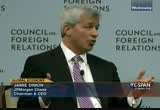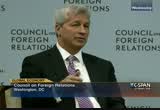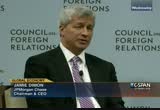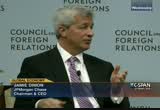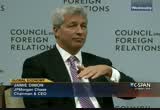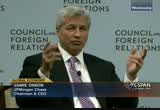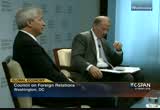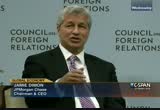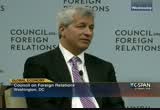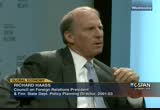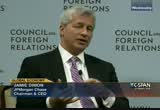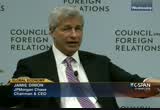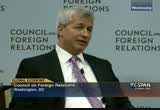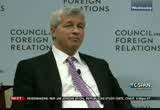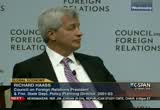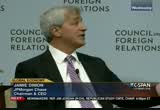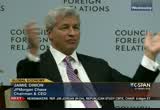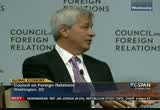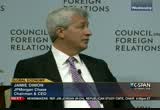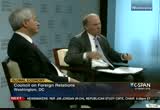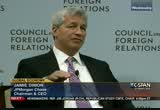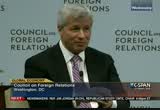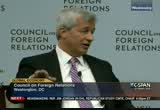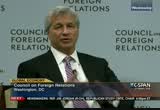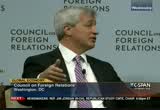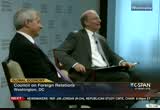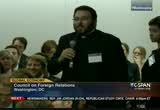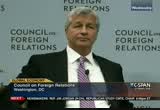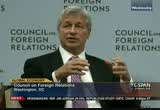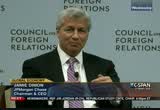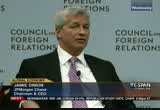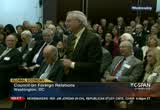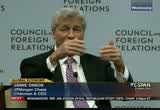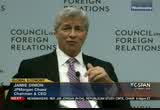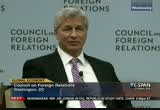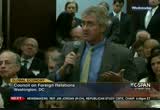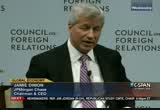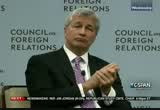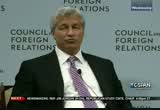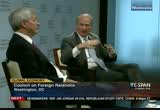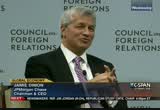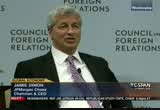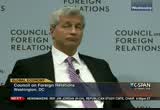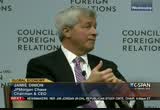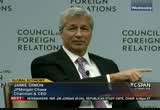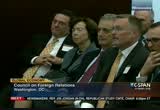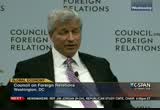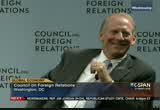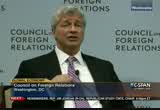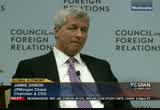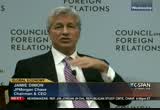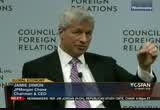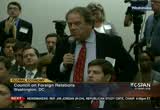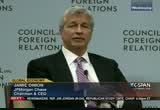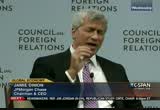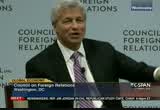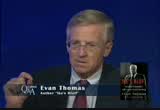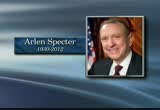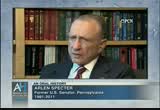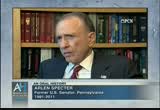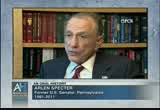tv News and Public Affairs CSPAN October 14, 2012 4:00pm-6:00pm EDT
4:00 pm
4:01 pm
they left and they were not replaced. the 16 troops that and you said you were watching in real time incidently but the 16 troops that were replaced or supposed to be replaced or going to be replaced you said no. and then you said well they were going to be in tripoli but the fact of the malt certificate they worked in tripoli but when needed they went down to benghazi, is that not right? >> i believe they made -- >> they did go to benghazi and could have gone to benghazi? >> yes. >> but they weren't there and you decided they shouldn't be redeployed? >> no as secretary kennedy
4:02 pm
stated the specialized skills they brought when they came originally had been back filled by other parts of the department. >> but not with u.s. military? >> no, sir. >> that's all i need to know. and i really appreciate you folks taking all the time today. >> colonel wood would you respond? you looked like you were chomping at the bit. would you agree with that? >> no, sir i would not agree. a special forces soldier is way above the skill level of a hired local national armed way pistol or even the m.s.d. agents that were on the ground as well. >> i think i remember the quote never take a knife to a gun fight. with that we go to the gentleman from connecticut. >> thank you very much mr. chairman. and i add my gratitude to those
4:03 pm
members of the diplomatic corpse who are putting their lives on the line for this country my sympathy to those of the families who were lost. i think the most important questioning was about 20 minutes ago about what level of security might have been necessary to repel this attack. and i wanted to pursue that one step further -- >> would the gentleman yield for a second? >> sure. >> in order to extra kate successfully those who died. i think it was made clear you can't repel ffer that size force. >> i want to talk to mr. nordstrom because you do say in your testimony that the numbers we're arguing about today, one or two additional unarmed security forces six or seven armed security forces may not
4:04 pm
have made the decinches. when you didn't really get the chance to answer that question fully so i wanted to pose it again to you. when you look back on this attack and what was requested versus what would be necessary in order to fully extra kate everyone or fully repel such an attack as this. do you think there is any amount of reasonable numbers that could have been present on the ground there at the time that would have prevented this attack and this tragedy? >> i'm just hesitant to speculate on specific numbers. but it goes without saying having more resources on the ground is generally not something you're going to turn down in a fire fight. i would rather have more guns, more special forces soldiers that have combat experience and more armed d.s. agents on the ground. certainly the more of those you can bring to bear the outcome is going to tip in your favor.
4:05 pm
>> and a similar question to the ambassador. we shudder at the notion that an attack like this could happen in the future that this exceptional event in which 120 attackers armed with aassault rifles could pose a threat to another installation. what is our position on trying to e equip our out post with the kind of armor and staffing that would be necessary to repel an attack of this size? is that possible and does this attack reframe your position and our country's position in terms of the resources we give our outposts? >> sir, we are never going to be able to achieve a defense of an american facility abroad
4:06 pm
against that level of le that willty with internally generated resources. what we try to do and have done it in many places around the world is we construct new embassies and we build into those new embassies physical protections that we hope will permit our personnel who withdrawn into that building with the capability to wait until the host government as they're required to do under the convention in diplomatic law responds to the attack. but an attack like that, we're never going to have enough guns. we're a diplomatic service. we have some of the finest law enforcement professionals in the world in the diplomatic service. but we are not an armed camp ready to fight it out as the
4:07 pm
military does. >> so let me ask a question, what have we learned and what has potentially changed if we can't repel this kind of lethal attack, are there changes that you can share with us as to how we protect our installations abroad? >> the accountability review board is going to judge whether our security there was adequate for the information that was available to us, whether we implemented it correctly and whether or not there are lessons learned. >> so they will make recommendations? >> yes, sir. >> thank you mr. chairman. >> tribbutes have begun pouring in for arlen specter who died today at age 81.
4:08 pm
president obama called him a fighter. former george w. bush said he loved our country and served it withty for three decades. he served his state and nation with honor and distinction. sect sect senator said he was a wonderful friend and colleague who in his fight against cancer set an inspiring example of strength and courage. soon after leaving the senate he sat down for interviews with the pennsylvania cable network. here is a short excerpt. >> the articles of impeachment for his young son sam. and that gave me the idea to get all00 snures on the articles of impeachment which i did. joe leaper man's signature was
4:09 pm
so undesifeable i asked him to sign it again. i've got 101 snures on it. >> then i got all of the house managers, hide it was chairman and lind see gram, i got all of those fellows to sign it. then i got all of the defense lawyers to sign it. the white house counsel. and then my son told me you're missing one signature dad. guess the signature i was missing? >> you're own? >> the president. >> when the trial took place --
4:10 pm
>> wait a minute. i got the president to sign it >> he did? >> sure. >> where is it now? >> hanging in a safe place. i -- people say how did you get the president to sign it and i say i asked him to. i handed it to him and he looked down and he saw chuck's signature. he's left-handed. he just signed it across the top. >> that was an excerpt from an old history interview with specter in 2011. the former pennsylvania senator died today at the age of 82. you can see more of that on c-span 3 today beginning at 4:40 eastern or on our website.
4:11 pm
>> the thing about eisenhower is that he would never tell anybody whether he was going to use nuclear weapons. why is this important? >> because in the 1950's when nuclear weapons were new and we threatened to use them at various stages. but nobody ever knew whether he meant it. and of course to be credible as a deterrent you have to be credible and he never told anybody. and i was fascinated by that notion. talk about the lonliness of command. what could be a greater command decision than that. here is a guy that ran the allied invasion in world war ii but now he's president and has a greater level of responsibility at a time when nuclear weapons are new. soviets are getting them and we've got them. tactical nuclear weapons, h
4:12 pm
bombs. are we going to use these things or not? he used them as a tool basically to avoid any war. >> even thomas on eisenhower's bluff tonight at 8:00 on c-span. >> on friday secretary of state hillary clinton said the state department cannot prevent every act of violence. talking about the september attack on benghazi. clinton said chris stevens knew the risk when he volunteered for the assignment. he was a speaker for north africa. this is 40 minutes. >> none of them are very hard. the first job is i want to welcome my friends and ambassadors.
4:13 pm
we honored that you came to join us today. second i want to ask after our keynote address is done, you all remain in your seats to help get the party out of the room. and my third task is to introduce somebody who needs less of an introduction than anybody in washington. general brother croft is national security advice tor to ford and bush. a graduate of west point. i think for all of us who have worked with him he's a model of judgment here in washington. he's a counselor and trustee of crirks is and i introduce general to introduce our keynote speaker. thank you. >> good afternoon.
4:14 pm
it's a real pleasure for me to be able to stand here for jon and introduce our speaker today. it's a testimony to the importance of north africa, to global security that the secretary of state has taken time to address this conference oh on the ma grab in transition. the forces that are surged through the arab world right now had many of their origins and some of the most promising opportunities for change in the region also have their origins there. we have also seen tragedy but we cannot forget that we've seen tremendous hope and it is that hope which mote vates us today. secretary clinton is no stranger to this topic and she
4:15 pm
has been putting energy into strengthening the u.s. bilateral relationships with the countries and the ties between those countries themselves since she came into office four years ago. her term as secretary of state follows a distinguished career in publish service as a lawyer in arkansas, as a first lady of the united states and more recently as the united states senator from the state of new york. she not only has the highest approval rating of any member of the u.s. cabinet, she has as well topped the gallop poll for 16 years as the most admired woman in the world besting the previous record of eleanor roosevelt who held the title for only 13 years. as america continues to engage in north africa, we are extremely fortunate to be served by a public servant who
4:16 pm
is engaged in these challenges day in and day out, who cares deeply about the issues and how they effect america's interest and who believes in a brighter future for the people of the middle east. please join me in welcoming the secretary of state, the honorable hillary clinton. [applause] >> thank you. thank you all. thank you very much and a special word of thanks to a friend and someone whom i admire greatly. his many years of distinguished service to our country is a great tribute in every respect. thanks also to john and csis
4:17 pm
for hosting this conference on the transition seeking trisht for his strong support of this important conference and members ofts diplomatic corp as well. why are we here and why is this conference so timely? to start with what happens in this region has far reaching consequences for our own security and prosperity. and we know very well that it is most important to the people of this region who is aspirations and ambitions deserve to be met. but recent events have raised questions about what lies ahead, what lies ahead for the region, what lies ahead for the
4:18 pm
rest of us who have watched with great hope as general said. the events that have unfolded there. a terrorist attack in benghazi, the burning of an american school in ton niss, these and other seens of anger and violence have understandably led americans to ask what is happening, what is happening to the promise of the arab spring and what does this mean for the united states? well, i certainly think it's important to ask these questions and to seek answers as you are doing today. and let me on a personal note start with what happened in benghazi. no one wants to find out exactly ha happened more than i do. i have appointed an accountability review board that has already started examining whether our security
4:19 pm
procedures were appropriate, whether they were properly implemented and what lessons we can and must learn for the future. and we are working as thuroughly and expeditiously as possible knowing that we cannot afford to sacrifice accuracy to speed. and of course our government is sparing no efforts no tracking down the terrorists who perpetrated this attack. and we are focused, as we must, on what more needs to be done right now to protect our people and our facilities. we had another terrible attack yesterday. i strongly condemn the killing of a long-time yemen employee at our embassy and we are working with authorities to investigate this attack and to bring those responsible to justice as well.
4:20 pm
but throughout all of this, we must not only focus on the headlines, we have to keep in mind the trend lines. we have to remain focused on the broader strategic questions posed by these democratic transitions and their impact on american interests and values. let me start by stating the obvious. nobody should have ever thought this would be an easy road. i certainly didn't. however, it is important to look at the full picture, to weigh the violent acts of a small number of extremists against the aspirations and actions of the region's people and governments. that broader view supports rather than discredits the promise of the abrab revolutions. it reaffirms that instead of
4:21 pm
letting mobs and extremists speak for entire countries. we should listen to what the elected governments and free citizens are saying. they want more freedom, more justice, more opportunity, not more violence. and they want better relationses not only with the united states but with the world, not worse. i have no i solutions about how comp kated this is. after all foreign policy has been shaped by debates over how to balance our interest in security and stability with our values in supporting freedom and democracy. recent revolutions have intensified these debates by creating a new birth of freedom but also by unseeding old
4:22 pm
partners and unleashing unprictable new forces. as i said last fall at the national democratic institute, we have to be honest that america's policies in the region will always reflect the full range of our interest and values promoting democracy and human rights and defeating al qaeda. defending our allies and partners and also ensuring a secure supply of energy. and there will be times when not all of our interest and values align. we work to align them but we do so acknowledging reality. and it's true that we taylor our tactics for promoting democratic change to the conditions on the ground in each country. after all, it would be foolish to take a one size fits all approach regardless of
4:23 pm
circumstances or historical trends. but in the long run the enduring cooperation we seek and that our interest and our values demand is difficult to sustain without democratic legitimate ma si and public consent. weeks before the revolution in egypt began i told arab leaders that the region's foundations were sinking into the sand. it was clear even then that the status quo was unsustainable. that refusal to change was its becoming a threat to stability. so for the united states supporting democratic transitions is not a matter of idealism. it is a strategic necessity. and we will not return to the
4:24 pm
faults choice between freedom and stability. and we will not pull back our support for emerging democracies when the going gets rough. that would be a costly strategic mistake that would, i believe, undermine both our interests and our values. now we recognize that these transitions are not america's to manage and certainly not ours to win or lose. but we have to stand with those who are working every day to strengthen democratic institutions, defend universal rights and drive increwsive economic growth. that will produce more capable partners and more durable security over the long term. today these transitions are entering a phase that must be
4:25 pm
marked more by compromise than by confrontation. by politics more than protests. politics that deliver economic reform and jobs so that people can pursue their livelihoods and provide for theiramilies. politics that will be competitive and heated but rooted in democratic rules and norms that apply to everyone, is lambist and sec laists. conservatives and lib rals, parties and candidates of every stripe. everyone must reject violence, terism and extremism. abide by the rule of law, support independent jew dish yares and up hold fundamental freedoms. up holding the rights and dignity of all citizens regardless of faith, ethnicity
4:26 pm
or gender should be expected. and then of course, we look to governments to let go of power when their time comes just as the revolutionary libyan transitional counsel did this past august, transferring authority to the newly elected legislature in a ceremony that was the highlight of chris steevens time in the country. achieving genuine democracy and broad based growth will be a long and difficult process. we know that from our own history. more than 235 years after our own revolution we are still working toward that more perfect union. so one should expect set backs along the way. times when some will surely ask
4:27 pm
if it was all worth it. but going back to the way things were in december 2010 isn't just undesireable, it is impossible. so this is the context in which we have to view recent events and shape our approach going forward. and let me explain where that leads us. now since this is a conference on the month grab that's where i'll focus. that's where it started and where a coalition stopped a dictator from sluthering its people and where last month we saw such disturbing violence. but let's look at what is actually happening on the ground especially in light of recent events. we have to as always be clear yide about the threat of
4:28 pm
violence extremism. a year of democratic transition was never going to drain away reservoirs of rad calism built up through decades of dictatorship nor was that enough time to stand up responsible security forces to replace the repress i have ones of the past. as we've warned from the beginning, there are extremmists who seek to exploit periods of instability and hi jack these transitions. all the while al qaeda and other terrorists groups are trying to expand their reach from a new strong hold. but that is not the full story, far from it. the terrorists who attacked our mission in benghazi did not represent the mill yons of libyan people who want piece and deplore violence. and in the days that followed,
4:29 pm
tense of thousands of libyans poured into the streets and mourn ambassador stevens who had been a steadfast champion of their revolution. you saw the signs, one read thugs and killers don't represent benghazi or is lamb. and on their own initiative, the people of benghazi overran extremmist bases and insisted that militias disarm and accept the rule of law. that was as inspiring a sight as any we saw in the revolutions. and it points to the undimmed promise of the arab spring by starting down the path of democratic politics. libyans and arabs across the region have firmly rejected the extremmist argument that violence and death are the only
4:30 pm
way to reclaim dignity and achieve justice. in tripoli, the country's transitional leaders condemn the attack, they fired the top security officials responsible for benghazi. the government issued an ult mate imto militias across the country disarm and disban in 48 hours or face the consequences. as many as ten major armed groups complied. now militias and extremmists remain a significant problem in libya. but there is an eft to address it that has now taken hold throughout the country. as libya grapples with the challenges of forming a government, the international community needs to support its efforts to bring these militias to heel and provide for all of its citizens.
4:31 pm
consider the birth place of the arab revolutions. last year an as lamb party won the votes in an open competitive election. i know some in washington took this as an only men of doom. but these new leaders formed a coalition with secular parties and promised to up hold universal rights and freed ms including for women. and the united states made it clear we would be watching closely and would assess the new government by its actions, not its words. this past february students and civil society activists shared with me their fears about extremmists seeking to derail their transition to lasting democracy. but also their hopes that responsible leaders and accountable institutions would be strong enough and willing
4:32 pm
enough to turn back that challenge. and indeed we have seen an intense debate play out in that society. for example, early drafts of the new constitution labeled women as complementary to men. but their active civil society raised strong objections and eventually the national constituent assembly amended the text to equality. civil society is wise to remain vigilant and to exercise their hard earned rights to safe guard their new democracy. like the hundreds of women who took to the streets to protest on behalf of a woman charged with indeenssi after she was raped by a police officer. these competing visions of the future were put to the test when violent extremmists
4:33 pm
attacked the u.s. embassy in ton niss and burned the american school nearby. how did the people and government respond? first, the government increased security around our embassy and promised to assist with repairs to the school which they have done. then they pub blickly committed to provent violent groups and from becoming a save hivene for terrorism. following through is essential. those responsible for the attacks must be brought to justice. the government must provide security for diplomatic missions and create a secure environment for foreign residents and visitors and the rule of law must extend to everyone throughout the country. the country's leaders also took to the airwaves to newspaper pages even facebook and twitter
4:34 pm
to denounce the attacks and the extremist i'dology behind them putting their own political capital on the line. the foreign minister flew to washington to stand with me and publicly condemn the violence. so we continue to support those changes that are occurring in libya and those leaders and citizens who understand what is expected of them if they are to fulfill their own hopes. now the situation in the rest of the middle east is different. they have not experienced revolutions but recent events have tested their values and resolve. last year when citizens called for change, month rock can society answered with major
4:35 pm
reforms followed by early elections and expanded authorities for parliament. an is lambist party leads the new ruling coalition along with a variety of other parties. after 13 years in the opposition. and we've been encouraged that its leaders have sought to engage all and have focused on creating jobs and fighting corruption and we continue to urge them to follow through on all of their commitments for political and economic reform. last month with anti-american protestors in the streets across the cities, the foreign minister traveled to washington for our first ever strategic dialogue. he could have avoided the cameras but instead he strongly condemned the attack in benghazi, embraced a broader partnership with the united states and pledged that his
4:36 pm
country would continue working toward democracy and the rule of law. algeria also has much to gain by embracing the changes that are taking place around it and we have seen some progress. the government held particle meantry elections in may and invited observers to monitor them for the first time. and it moved quickly last month to protect diplomatic missions including the u.s. embassy and diffuse tensions in the streets. but still algeria has a lot of work to do to up hold universal rights and create space for civil society. a message i delivered at the highest levels in person in february. now what do these snap shots and stories from across the region tell us? on the one hand last month's violence revealed strains of extremism that threatened those
4:37 pm
nations as well as the broader region and even the united states. on the other hand we've seen action that is would have been hard to image a few years ago. democratically elected leaders and free people in arab countries standing up for a peaceful, pleuralist future. it is way to soon to say how these transitions will play out. but what is not in doubt is that america has a big stake in the outcome. last month at the united nations assembly in new york i met with leaders across the region. and i told each of them the united states will continue to support emerging dem sis as they work to provide effective security ground in the rule of law to spur growth. we've made those three
4:38 pm
priorities the hall mark of america's involvement in the region. we've convenienced donor conferences to coordinate assistance, leverage partnerships and we have stepped up our engamente with the arab league signing the first memorandum of understanding for a strategic dialogue between us. but we recognize that words, whether they come from us or others are cheap. we talk about vesting in responsible leaders and institutions it has to be followed by actual investments. so we have mobile liesed more than $1 billion in targeted assistance since the start of the revolutions. and the obama administration has requested from congress a new $770 million fund that would be tied to concrete benchmarks for political and
4:39 pm
economic reforms. and i again urge congress to move forward on this priret. but let me briefly just address the strategy starting with security. the recent rites and lawlessness underscore the challenges of safe guarding free societies and reforming security forces. for decades those forces protected regimes. now their job is to protect citizens especially against the threat from violent extremmists, for some time al qaeda and other terrorists groups have launched attacks and kidnaps into neighboring countries. now with the chaos there allowing these groups to carve out a larger safe haven they are seeking to extend their networks in multiple directions. so we are using every tool we can to help our partners fight
4:40 pm
extreme itch and meet their security challenges. we recently embedded additional foreign service officers with regional expertise into the u.s. africa command to better integrate our approach. across the region development experts and military personnel are working hand in hand. across the region also we're partnering with the security officials of these new governments who are moving away from the repressive approach that is helped fuel rad calizization in the past and we're trying to help them dwom grounded in the law of human rights. we're helping border guards tithen their patrols so weapons don't flood the region more than they have. we're helping train prosecutors and build labs that can produce evidence that stands up in courts.
4:41 pm
and last month, just days after the rites in tune niss we launched a new partnership to train police and other justice officials and we are very pleased they agreed to host an international training center that will help officials from across the region develop means to protect their citizens security and their liberty. now the nations are not the first to struggle with the challenge of protecting a new democracy. and one of the lessons we've learned around the world is that training, funding and equipment will only go so far. it takes political will to make the hard choices and demand the accountability that is necessary for strong institutions and lasting security. and it takes changes in mind sets to make those reforms stick. in all my conversations with high ranking officials in these countries, i recognize that
4:42 pm
particularly in libya the people i'm talking to were often victims of security forces imprisonened, seeking exiled, beaten, some cases tortured and for them all of a sudden to find themselves on the side of security forces, even ones that are of the new regime takes a mental change. and they have admitted that it is a responsibility that they now understand they must assume. the united states is also stepping up our counter terrorism efforts helping the countries of north africa target the support structure of al qaeda and its affiliates, cutting off financing, countering their i'dology, denying them recruits. our counter terrorism partnership is building the
4:43 pm
capacity of ten countries providing training and support so they can better work together to disrupt terrorist networks and prevent attacks. we are expanding our work with civil society organizations, in e specific terrorist hotspots, in particular villages and schools. now the social challenges fueled the revolutions and the calls for reform. and in order to succeed, these emerging democratic governments need to show they can deliver concrete results. so that is the second area we're focused on, working with small and med yume sized enterprises which create jobs and at tives to rad calism, bringing women and young people into the formal economy, providing capital and training for sbre prenures. helping dem sis update their
4:44 pm
laws their trade policies so their private sectors can actually flour risch. we're establishing an enterprise fund with initial capitalization of $20 million in the private sector and provide businesses with needed capital. the overseas private investment organization is offering 50 million in leens and guarantees and helping address long-term constraints to economic growth. we've provided export training for small business owners and job training to hundreds of young people. i am particularly proud of the new $10 million scholarship fund we launched in august to help students study at american universities and colleges. we also look forward to working on economic issues with the new libyan government once it's
4:45 pm
formed. we are helping nations trade with each oofment that will create new jobs for their citizens and new markets and products. it is one of the least integrated regions of the world. it doesn't have to be that way. and opening the border would be an important step in moving toward that integration. the third key area in our strategy is strengthening democratic institutions and advancing political reforms, not an easy process. as we can see from the difficulty of forming a government in libya. and political growth as to come sfrtnide not from abroad. but there are ways we are helping. in libya the united states has trained hundreds of lawyers and civil society activists on election laws and offered tutorles to campaign managers in the run up to the recent
4:46 pm
elections. now we're encouraging civil society to be fully engaged in drafting a new constitution that will protect the rights of all the libyan citizens. similar efforts are under way. none of this is happening in a vacuum. the transitions occurring there are linked with developments across the wider middle east. egypt of course the largest abrar nation, we've seen its new leadership say that the success of egypt's transition depends on building consensus and men and women of all faiths and communities. now we stand with the people there and their quest for universal freed ms and protections and we've made the point that egypt's international standing depends
4:47 pm
both on peaceful relations with it's neighbors and on the choices it makes at home and whether or not it fulfills its own promises to its own people. in syria the assad regime continues to wage war against it's own people even as territory slips from its graps. i recently announced humanitarian aid for the humanitarian opposition and we remain committed with our partners to increase pressure on the regime. and in yemen where we supported negotiations that achieved a transition, we are working to prevent al qaeda from threatening these emerging fradge jill democratic institutions and prevebt them from finding a save hivepb to
4:48 pm
launch attacks. when i met with the king of jordan last month we discussed continuing reforms to move his country toward more democracy and property. so in all of these places and many others, the united states is helping the people of those nations chart their own decemberty anies and realize the full measure of their own human dignity. dignity is a word that means many things to different people in can cull chures but it does speak to something universe until all of us. as one egyptian observed freedom and dignity are more important than food and water. when you eat in humiliation, you can't taste the food. but dignity does not come from avenging perceived insults especially with violence that
4:49 pm
can never be justified. it comes from taking responsibility for once self-and once community and if you look around the world today those countries focused on fostering growth are pulling ahead. building schools instead of burning them, investing in their people's create tivet not encouraging their rage. empowering women, not excluding them, opening their committees and societies to more connections with the wider world, not shutting off the internet or attacking embassies. i remain convinced that the people of the arab world do not want to trade the tyranny of a dictator for the tyranny of a mob. when they rejected the extremmist in their midst what they hoped for. so did the leaders of libya
4:50 pm
when they challenged the militias and when they spoke out against violence and hatred. that is the message we should take from the events of the last month. now i want to add and close with one more thought about what happened in benghazi because as you might expect, that is for me and all the men and women at the state department very personal. i did police woman si by it's nature has to be often practiced in dangerous places. we send people to diplomatic posts in 170 countries around the world and yes some of those are in war and conflict zones. others are in unstable countries with complex threats and no u.s. military presence.
4:51 pm
that is the reality of the world we live in. and we will never prevent every act of violence or terrorism or achieve perfect security. our people cannot live in bunkers and do their jobs. but it is our solemn responsibility to constantly improve to reduce the risks our people face and make sure they have the resources they need to do those jobs we expect from them. and of course, nobody take that is more seriously than i and the security professionals at the state department do. chris stevens understood that diplomats must operate in many places where soliers do not or cannot, where there are no other boots on the ground and security is far from guaranteed. and like so many of our brave colleagues and those who served
4:52 pm
in our armed forces as well, he volunteered for his assignments. last year our ambassador to syria robert ford was assaulted in damascus by proregime thugs but he insisted on continuing to meet with peaceful protesters and serving as a living manifestation of america's support which and when he drove to the city of ham ma the people there covered his car with flowers. people like chris and robert represent america at its best. they know that when america is absent, especially from the dangerous places, there are consequences. extremism takes root, our interest surf and our security at home is threatened. so we will continue sending our
4:53 pm
diplomats and development experts to dangerous places. the united states will not retreat. we will keep leading and we will stay engaged everywhere in the world including in those hard places where america's interest and values are at stake. that's who we are and that's the best way to honor those whom we have lost. and that's also how we ensure our country's global leadership for decades to come. thank you all very much. [applause] . >> on news makers ohio congressman jim jordan chairman of the republican study committee discusses the 2012 campaign. he also talks about what congress might do in the lame duck session and whether the bush tax cuts should expire. news makers today at 6:00
4:54 pm
eastern on c-span. >> c.e.o. of j.p. morgan talks about the foreign ration and get. he said j.p. morgan has lost up to 10 million dollars as a result of>> good afternoon. stearns. i am richard haas and want to welcome you all to the council on foreign relations. and to today's ceos speaker series meeting. this is part of the council and foreign relations program to increase the programs and links between the business community and the foreign policy community. which to one extent or one in the same. i also want to thank, rather will come those around the world and the country who are participating in this meeting through the wonders of modern technology. speaking of modern technology, if people would just take a second to turn off their cell phones and the like.
4:55 pm
that would be most welcome. this meeting is on the record. anything you say, sir, can and will be held against you. in this day and age, probably some things you haven't said will be used against you. >> there is no such thing as privileged and confidential any more. >> the phrase someone needs no introduction is often used. it actually applies. jamie dimon is not simply the head of one of the principal financial institutions in this country, jpmorgan chase. but i believe has emerged as one of the most important and influential spokesman for the worlds of finance and business in the united states. which we are going to have this conversation today for a few minutes, and then will open it up to you all for your questions. let me get one or two conflicts of interest off of the table.
4:56 pm
i should say that jpmorgan is a corporate member of the council of foreign relations. one of around 175 corporate members. and i am a shareholder in the company. unfortunately, i am a distinct minority shareholder. and i wish it were enough to present a conflict of interest. but alas, it is not. so, there you go. mr. dimon as i expect many of you may know is of greek heritage. so in the last 24 hours, the chancellor of germany has been visiting the country of your ancestors, of your forbearers. how worried are you about the prospects for greece? and what it might mean, not just for greece and europe, but because of globalization and economic linkages for the united states and indirectly for your organization? >> thank you for the introduction. my ancestors left greece like 1915. so you cannot blame me for what
4:57 pm
is going on there. but i remember my grandfather coming home years ago, and greeks on both sides are yelling and screaming about the then prime minister. who was the grandfather of the guy who was the prime minister a while back. almost the same point. socialism, capitalism. the same basic argument. we all want to greece to succeed and survive. but from an economic standpoint, greece is not the issue. greece is a couple hundred billion dollars of debt. but the exit of greece on its own is not the catastrophe. the catastrophe is that you have a default of greece before you have a firewall with italy and spain. you have a good likelihood that you will have a run of the banks in italy and spain. in italy and spain do not have the wherewithal to stop the run of the banks. they need the money. they have things called central banks, but they cannot print euro, which puts them in a difficult position. and that is why you need a banking union, fdic deposit scheme.
4:58 pm
$700 billion has already left italy and spain. it went to germany. the german banks deposited -- the bundesbank. the bundesbank by law had to lend it back to the italian and spanish central bank's. the problem has already been widened inside europe. so to solve europe you need three things. you made to stop the banking crisis in italy and spain. you need a real fiscal union. they have one that does not work. a lot of people said it would not work, but it was really a minority. it is bleeding slowly. i do want to remind you -- there are really good reasons for a union. one is political. this is a continent that, for hundreds thousands of years, they had multiple wars, hundreds of millions of people had died. you could say that is a good objective. let us have a political union so we cannot kill each other. the second is an economic union. a common market. there would look at the united states and say, we have a
4:59 pm
common market. the catastrophe is the default of a priest before you have a fire wall for italy and spain. there's a likelihood the will run into issues. they do not have the wherewithal. they need the money. they have central banks but they cannot print the euro which puts them in a difficult position. most of it went to germany and they deposited into the bundesbank and they had to lend it back to the italian and spanish central banks. the problem has been widely centralized. to solve europe, you need three things. need to stop the banking crisis
5:00 pm
the international financial meetings in japan. one thing coming out is the imf predictions for the slowdown in global economic growth. alcoa announced this morning the drop-off of global demand for aluminum which is sending an indicator. are you seeing the same thing in your business operations? you are a truly international institutions. are using a sign a slowdown? >> not quite like that. europe is in a mild recession. the government is going to are you seeing the same thing in your business operations? you are a truly international institutions. are using a sign a slowdown? >> not quite like that. europe is in a mild recession. the government is going to spend 50% of the money. that will not go down. asia is a slower but it is nothing mystical or different than your read about. united states is fundamentally a stronger than people think, in my opinion. in latin america, some are better and some are slower. >> asia use same syncline about. -- you seem sanguine. >> this in my opinion, but i. they will meet their objective of 7%-8% higher.
5:01 pm
they are doing this to avoid social unrest and change the infrastructure. it change will be coming and it will be smoothed and continue to form the policies of the government. they have $3 trillion in reserve and a lot of capabilities to maintain growth. they did that that month, literally. they knew what they want to accomplish. i do not think i can do that 10 years from now. they're not building a lot of bridges to nowhere. i think it will work in the immediate term. >> there's a lot of talk about africa. in latin america, we have seen signs of pretty robust growth.
5:02 pm
>> we're opening grove -- stores and we are in there on the ground. we go there for the multinational clients. where they go, we go. , is the same with latin america. -- it is the same with latin america. we will be making consistent investments. we need a better job with monetary policy. >> we are not doing as well as we should in the united states, so let's turn this inward. how much are you planning for the fiscal cliff?
5:03 pm
>> that's the big deal. when the eurozone crisis happens, we spend $50-$100 million preparing. be visible club does not quite that because it is more critical double what the outcome will be. we have a fiscal cliff command center, a war room. we understand all of it and we will be prepared. jpmorgan will survive its fiscal cliff. i just think it's terrible policy to allow it to get close. is it bad that there's just so much gdp? there are always potential outcomes and i would defy anyone to ask for more. let's see. let's try to avoid that.
5:04 pm
it will not happen midnight on december 31st. they want to start to make decisions with the margin. don't hire, don't build, wait an d see. that's a recession. >> do you agree that it is less of a cliff and more of a slope? >> probably, yeah. >> let's conduct an omnibus deal. they will kick the can further down the road. how worried are you that the united states cannot do something on the order of $4 trillion over a decade kind of comprehensive deal. how worried are you that suddenly this is red hot because
5:05 pm
it eventually moves across the united states. >> it is assured, the question is when and how. it will happen. it is a matter of time. the united states cannot borrow indefinitely. country after country after country just thought they could get away because we're the military power of the world. why would you take the choice of wait and see? it could enhance growth and jobs. i believe, had simpson-bowles been done, we would be booming. america knows the way. we do not have the will. a more efficient tax system,
5:06 pm
more certainty. i think we would have been booming. it's doable, but we need the leaders saying we're going to do it. >> when you think of something like simpson-bowles, do you think it needs spending reform, tax increases? >> we can all sit here. i think it is 21% and then you have an efficient tax system. it is a far more efficient tax system so it gets this huge waste, this coefficient cost, not a bad tax system, a legal system, uncertainty. you would have had better growth. i'd think it was four to one, or whatever it was, but close enough would have been good enough.
5:07 pm
it does not have to be exactly right. once. starting a down, it would pay for a lot. >> the united states has been now growing at roughly half of what you might call the modern historic rate of economic growth. we're growing in fiscal 2002, give or take. if you were advising the next president, be it obama or romney, to sayublicly here are the few things we should do in order to generate economic growth, one would obviously be some kind of comprehensive budget deal, but what else would be the -- on the jamie dimon list? >> america is a great country. the president should recognize one thing for certain. i think this attitude is just not true.
5:08 pm
we of the best military on the planet and we will four years. we have the most transparent capital markets in spite of what happened. investment, of capital, private equity. we have among the best businesses on the planet, small, medium, and large. i'm not talking about steve jobs. i'm talking about all around the factory line. we need to invest more in capital equipment. i think we have a slight polluted system at this point. the work ethic is still there. this is still in the time and the world. it would be here. we need to get beyond this. my god, the most profitable energy.
5:09 pm
god is looking down giving us and saying, "i hope you get this one right." we have a problem. we need to diagnose the problem. housing is turning. why are really growing at 2%? this one i cannot prove. europe is ok. there is a huge wet blanket out here. to me, as all the uncertainty around taxes, policy, fiscal cliff, the debt ceiling fiasco. we have this constant anti- business feeling. wherever i go, i have business people say the environment is terrible. it's not just banks. we have done this to ourselves.
5:10 pm
we shot ourselves in the foot. get rid of the wet blanket and we will take off. there was a great article that was reprinted in "the wall street journal" giving president-elect ronald reagan some advice. tell the same positive story over and over and will turn. yet to believe in it. america usually will do the right thing after it has exhausted all other possibilities and i hope we do. if you think washington and business can go to work, the collaboration's, we should have a collaboration. we would double the other and worked round-the-clock but now and has became a war.
5:11 pm
dodd-frank, health care, so we re-litigate. we should get it right the first time and move on but we did not. >> to the extent there has been a marked absence of collaboration or friction between the worlds of politics and business, you but the lion's share on the political side? >> i would put more on the political side. everyone i know is coming down and asking what they can do for help. it surprised me when someone asked a question, do you want universal health care pro- american citizens, 80% say yes. they wanted done right a certain way, but there was a huge effort to pull together to make it work. it didn't happen. you know politics far better
5:12 pm
than i do. it didn't happen. it still could, so let's do it again. let's try again. we know it to ourselves to the best we can. >> let me put this out there for regulatory concerns. there is something of potential in the pendulum of over regulation. there is one school of thought that it has gone too far, the other that it has not gone far enough. >> we have a lot of people with deep opinions and little knowledge. they find a fact to justify their thought. that's not how you do good policy. we need in regulation in america. good regulation is a good thing.
5:13 pm
good does not mean more or less. it means good. you cannot drink when you drive. 65 miles per hour on the highway. we created such confusion over jurisdictions. no one would adjudicate. when people to commit fraud, they make mistakes and you are attacked by 17 different agencies as opposed to the only ones responsible. really good possible -- policy, clarity. what they're saying is that they need more capital. ok. fine. that makes sense. let's have the debate and look at the facts. i support a lot of capital and liquidity, but at one point it will go too far. some of these are laws written in basel. they are written for other people and other purposes.
5:14 pm
they say we have to have a common ground and make it fair for everyone. i agree with that concept except that it's bad for america. if we're not going to do it, the rest of the world cannot make us. >> what about the poster issue of proprietary trading, the volcker rule, all of that? where did you come out on that? >> after dodd-frank, the blueprint, the white paper, and never went through in their two cents, i would argue that was completely unnecessary. it was not the problem. we supported a lot of dodd- frank. you are either for or against it. there are like 2000 things in dodd-frank. the volcker rule had anything to do with the crisis.
5:15 pm
it is something that he felt deeply about. keep trading safe for big financial companies? i agree. we need to get rid of too big to fail. i agree with the intent. we do not do any crop trading. we have the widest, deepest, most transparent capital market in the world. that's not throw the baby out with the bathwater. the struggle is trying to find how you restrict market-making. you almost cannot. the laws are so vague that it's hard to determine. i just hope we write this in a way that we end up with the widest, deepest, most transparent capital markets in the world. the regulators came out with their 180 things from around the world. asset managers, central banks, governments -- let's just get it right.
5:16 pm
at one point, there needs to be a dialogue. >> should most regulation come from the outside door should firms have a large role in self policing? >> regulation should be formed and designed with the practitioners, too. because this crisis they were kept out of the process. that's kind of a mistake. keep the doctors out. of course banks make mistakes. banks should be punished. it would be better to sit down and have the conversations to improve the system and set of people just dumping 5000 pages
5:17 pm
of rules to try to get what they need. in our great economic ecosystem, there are all different types of entities, big banks. we bank in 50 countries. that's why we're here. we do a lot of things that people cannot do. some of these rules are terrible for small banks. who is the biggest banker of the banks? and jpmorgan. >> mentioned to been to fail. there is some thought that you shouldn't be broken up. how does one deal with that? other than people having tremendous faith in you and your successors, how do we deal with the problem that if jpmorgan ever made an institution-threatening mistake that it could be fixed? >> this has nothing to do with glass-steagall.
5:18 pm
hedge funds had problems early on. mortgage brokers, indymac, wamu. lehman, bear stearns, aig, and the biggest financial concerns -- fannie mae and freddie mac. it was not a glass-steagall foundation. you should never pay if jpmorgan fails. konk >> it should be called minimally damaging issues for big, dumb and banks. >> i think it should be called bankruptcy. i think they recommended chapter 14. it is like a hospital and it goes bankrupt.
5:19 pm
in a financial company, you just need the money running through the system. it could be done. there was quite a success for the fdic. the ways you want to structure it legally is to say if jpmorgan starts to fail and they filed chapter 14, here's what happens. yet freeholders and the unsecured holders pay everything. jpmorgan has $400 billion of unsecured debt. there's no way we will lose that. the citizens never pay. when that happens, all directions are fired and the name is buried forever. we remember why it should not happen. it should not hurt the economy and stuff like that. i agree. those, we should be doing.
5:20 pm
>> the reason these companies get bigger as we forfeit things to clients like better, faster, cheaper. that's capitalism. you buy it because you like it. you go to wal-mart because you like the price. many go to a public trading desk, you like the price. nothing wrong with that. if we did not have productivity, we would be out on a heard hunting buffalo. there are some negatives to it. sometimes things don't survive, but look what happens over hundreds of years. it's a wonderful, beautiful thing. we have to get rid of too big to fail. dodd frank has the elements of that in there. it lets the elements compete in the marketplace.
5:21 pm
>> several months ago, you had the derivatives experience subject in part and there is the profile. what is different about risk- management now? if you will, what are the lessons learned and changes implemented? >> this co., jpmorgan chase went through 2006-2012 and never lost money in a quarter. we did not need tarp. where were there for a lot of people who were not. hospitals, schools, businesses. we bought bear stearns at the request of the government and we bought washington mutual for ourselves at a tremendous cost that we did not pass on to other banks. we are pretty disciplined risktakers. there is a gap in the line.
5:22 pm
we screwed up. that quarter we made $5 billion. it was a stupid error. it's kind of embarrassing, personally. it will not sink our ship. we have $150 billion in capital. this will be a third year in a row to set a record year and that's our job. if an airplane crashes, do we stop flying all planes? if a drug does not work? the stock drug manufacturing? you have to be really careful about drawing conclusions which are not proper. it is a shareholder mistake that did not cost anybody money. that gap does not exist most other places and there were
5:23 pm
lessons learned. businesses make mistakes, they learn from it, and they get better. that is what business is. only when i come to washington to people act like making a mistake should never happen. of course it happens. all academics say this is somehow not allowed. [laughter] >> i would love to take that last comment personally. why don't i open it up at this point? i have one or two in the and i want to close with. wait for a microphone and let us know your name and affiliation. the gentleman there next to the microphone? yes? >> father andrew from a monastery. the reported the roman catholic
5:24 pm
church spent $171.60 in 2010 and $18 billion was financed through tax and municipal bond purchases. what is jpmorgan doing to help faith-based organizations meet our capital needs over the long term? right now is a good climate for us. if we want to borrow now and pay it over time, we are 16 million -- 1600 years old. >> how much do you want to borrow? [laughter] >> we banquet governments, non- profits, hospitals, churches. i would be happy to share this with you. we advise people. you have to be very careful in the lending business. they want to shell -- so you
5:25 pm
what ever you have cash for. they will say they will not do it and it's not good for you either. it is like selling too much liquor to someone. send me an e-mail and i will give you all the information you need. >> take one minute to talk about this large organization with an enormous profit. what is your sense of corporate responsibility? what does jpmorgan deciding -- decide for itself? >> my job is to build a healthy, vibrant company. it is no different than the corner store that participates in the community to help the
5:26 pm
little league or the local church to give people summer jobs, some philanthropies sometimes, and we do that everywhere. we do almost $200 million per year. corporate responsibility around the environment. we go into lots of cities and we help them grow economically to create jobs, help the environment. we do a tremendous amount for education and veterans. we have hired -- thank you, veterans -- 4800 veterans in teh last 18 months or so. 17 companies have hired 70,000 veterans. a lot of people are talking. we're doing.
5:27 pm
we try to participate. healthy, vibrant company makes all this possible. with a dying company, none of this is possible. if i did not make the customers happy, there is no anything else. i have never separated them. in that, we will be making mistakes. that may go back to this issue one more time. we have something like $15 billion exposure to hedging and stuff like that. you could easily tell me to get that down. we have been in spain for over
5:28 pm
100 years. if you are italy, how would you feel it jpmorgan cuts and runs? do not be a fair weather friend. be here in good times and bad for me. just like that, things go bad. everyone knew that italy and spain would go bad. how could you not know? you made a decision. it may be the wrong decision. this is deliberate. we hope to still be doing business there in 50 years. we try to moderate it, but we need to be good corporate citizens. i'm lucky. i stand on the shoulders of those who have come before. the knowledge that jpmorgan has in the relationship in these
5:29 pm
countries, they go back. we cannot cut and run. >> let's go to the front row here. >> mr. dimon, when you look at jpmorgan today, what is the difference? i would like you to comment on the issue of oversight. you made a persuasive argument, but i have not heard you use the word "oversight." >> we have boards, regulators, and more oversight. we do the same thing for consumers and businesses. we lend the money. we do not lend directly, but it's almost the same period a
5:30 pm
someone says they want to borrow money for that project, we might say the cheapest route is a bank loan and then there are derivatives. but most of the more interest rates or forex. we moved something like $5-$10 trillion per day for corporations around the world. we do this through different currencies, countries to pay your vendors. savings account, checking account, mortgages, loans, oil. this will not change. you'll still have financial and vice and will still be doing it.
5:31 pm
they're doing their around independent view of this fiasco. inside jpmorgan chase, every business has a brisk committee. one dozen lawyers, 1500 compliance officers. it is huge. we make markets in other countries and we buy and sell a couple trillion dollars per day. you can come to us in london or wherever and buy bonds. what you want from us? great research and a great
5:32 pm
price. we are a store. me sell you that. it's a little riskier than that because it's a little more volatile business. we do a great job for you. we give you great price, service, and that's why we get your business. we hope to continue to do that. this is integral to the fact that ibm could call us right now and raise this in hours. they are directly related. we do research. they're really like that. >> we will scurry about with the microphones. >> i may risk and performance manager. -- i am a risk manager.
5:33 pm
what makes good regulation? why did this not live up to the hope that it would keep banks from getting in trouble operating between the mortgage market and the securitization markets? that was the hope when it was passed after the crisis and it could be a good test case because it was a combination of things, as i recall. at least one novel idea that a number of bankers thought was interesting is that they would come in before the equity is entirely gone so that they are not tempted to take big risks. why did not not help forestall the latest financial crisis? >> the financial crisis is a little more complex. too much leverage in the system and there's too much leverage everywhere. that is no acquisition of europe.
5:34 pm
5:35 pm
i believe in transparency. i believe in clearinghouses. a clearing house does not eliminate risks. it's standardizes it. >> all the way in the back. >> justine underhill. now there's a civil lawsuit for bear stearns related to fraud, do you regrets participating buying bear stearns in 2008? what did you miss when you said it would not be material. >> we were asked to buy bear stearns. we did them a favor. let's get this right.
5:36 pm
we have the capability and capital to do due diligence. the one thing i was terrified about was there were all these lawsuits and there would be no money, no action. there would be no money. the second we bought it, we knew we were buying this as it would play out. knowing what i know today, it's really close. but they called me in again to do something like that, i could not. my board would not let me. i did get a letter from one of the senior regulators that said, please take into consideration when you want to come after arrests down the road for something bear stearns did that jpmorgan was asked to do this by the federal government. there are some great people and some terrible things.
5:37 pm
i forgot the exact number, but we have lost $5-$10 billion on bear stearns and i would put that in the unfair category. i'm a big boy. we will survive. >> the financing the fed did was mortgages. we kept the non-investment grade mortgages. we borrowed more, became more leveraged. if you hold on to these things that you got for 0%, you'll get your money back. [laughter]
5:38 pm
5:39 pm
do you know what teh financial assets of the nation are? $80 trillion. people have mention argentina, the weimar republic. there was gdp every year in financial assets. things are in pretty sound shape. there's a lot of fiscal monetary stimulation. we think corporate america has $1.50 trillion too much cash. for consumers, i would say you are all holding on the cash because you were scared. here is the best case-worst case scenario. we grow up 4% capitalization goes up, inflation goes to 3.5%.
5:40 pm
the 10-year rate goes to 5%? that would be great. it's possible. the worst is skyflation. we've had that before in this country. what we need now is good fiscal policy. you have to get on board for that. that is what will kill this thing. we need to get our act together controlling our fiscal deficit in the future. >> i assume you favor a change in corporate taxation? >> the current system does not work. if they say -- prove it. it's hard to prove that in real time. today that it's different this time? five or six bad examples is because of bad policy. ben bernanke, jr., will write a book down the road sign we could
5:41 pm
have made this better. one thing is taxation. we are training immigrants and sending them back from. some companies have to invest here. if your building a semiconductor plant, a data center, a research center, it does not have to be here. a lot of it can be made over there because taxes are lower. it makes their returns 30%-40% higher. that's economics. separate morality from economics. set up the economic system that is conducive to growth, conducive to jobs, conducive to g.d.p. and then we will have a conversation. i do not mind paying 36.9% in taxes or of my capital gains separate 20%. i want a society getting more
5:42 pm
economical. do not mess up the economic engine making this possible. you can talk to business people all day long and its anecdotal. we are driving capital and brains overseas. the problem with that, by the way, is they are sending engineers, or randy, and other people over there. some may stay -- sending engineers, research and development over there. >> since the crisis, i have had numerous conversations with people who might consider very intelligent will say something like this to me. we need to return glass-steagall by instituting the volcker rule. or we need to restrict banks from taking any positions in a variety of securities that are their bread-and-butter. when i tell them they cannot underwrite without breaking the
5:43 pm
markets, it passes over their heads. it seems to me the industry itself, maybe because of the political dense, and they could do a better job explaining what their business is and what you are required to do to make the business work for the customer. what do you think? >> obviously want to do a better job. everyone is talking about turning that trust and doing a better job explaining these things. a lot of people say things they just do not understand. i did not realize this, and you can punish me for this, too, when they said all of the banks failed and bailed out, the game was over. that was it. it was predicate it on those
5:44 pm
two lies. jpmorgan is an important business. there were not going to fail. they did not need tarp to succeed. they're going to make loans and do what they had to do for america. on not going to give up. i love this country so much. that's why i do things like this. that is why i want transparent capital markets. capital markets. what is market-making? as market making in number? not grass grass -- [laughter]
5:45 pm
is market making in everything? there are markets in china, russia, cuba. if they can sell you goods for a better price over there, that's what people do. it's not like there is a morality around that. we are teaching people all the wrong things. thanks to technology reform, they should be fixed. we should be punished for what we did wrong. the punishment should fit the crime so we can move on. they feel like it was old testament justice. including the bank that failed, they have given a lot of money. there is some truth to that. i cannot make up what they did and did not do. there were people who destroyed the company's and virtually
5:46 pm
brought this down to its knees. it causes me off, too. >> just to defend the old testament for a second. the idea was that the punishment should not exceed the crime, so that was a progressive innovation at the time. [laughter] >> i did not think of it that way, but ok. >> about four years ago, the chief security officer told us there had been up to 1 million attempted intrusions', cyber intrusions', in one day. how concerned are you about the cyber threat, cyber crimes, and cyber terrorism? >> we get hundreds of thousands a day. we have these major security centers and we work with big government around the world to protect ourselves. they're flooding the lines and a lot of these are coming from
5:47 pm
iran. then we say, you cannot get through. they're not getting inside the computers, but we spend a tremendous amount of time and effort on cyber security. we are in favor of the new cyber security laws, we think they should be done in collaboration, not these old laws that are set up saying, you should be cyber secure or we will come after you. the cia, and they say, department of defense, they know when we are attacked the border and we do not. we're going up the work together to protect the american public's we can stop cyber crime. it's a big deal. it's going to get worse. computers in 10 years will be 100,000 times faster. we're going to work on that in every way, shape, and form. banks are pretty good at this. we have been doing in a long
5:48 pm
time. we have to really stay in front of it. those of you who worry about it, it does not only come over the this -- the internet. think about when they join your company from the inside. that's where we're going to get. >> thank you for reassuring point. [laughter] the young lady in the second to last row. >> that is why you have fire walls to prevent everyone getting to all of these systems. >> many of the roles coming out of dodd frank have yet to be written. how much of an impact is this having under business? >> it the look at this quarter, we will release earnings on
5:49 pm
friday, it's pretty good. small business loans are up, 12 straight months. middle-market loans are up. market shares are up. trades have been ok. mortgage loans are up. mortgage problems are coming down. it's actually pretty good. i think 25% of dodd frank has been done. it's really hard for me to calculate a number. it is costing us $1 billion in overhead at one point. a lot of these rules are contradictory, overlapping. all i want is at one point this it down and have a conversation about what we need for safety and what is creating and unnecessary burden? i would not want to hurt community banks. they have a great loan life. i just think we need
5:50 pm
cooperation to get this done. it's not going to be done properly if we always fight. the most important -- capital and liquidity. and there are 398 other rules. we're trying to work with everyone and accommodate. we have no choice. we are going to do it and we will do it in a way that is fair and levels the law. that is what we will do. they get mad when i comments at all. we will meet the terms we're required to me. another conversation is that jpmorgan will be fine a matter what. believe me. don't worry about jpmorgan. i'm worried about the country. we should do these things right for the future of america, not jpmorgan. >> i apologize in advance for the many people with their hands up.
5:51 pm
demand is exceeding supply. >> i am garrett mitchell and i write the mitchell report. i want to ask you a too big to fail question but this is not about jpmorgan chase or barclays. it's about the u.s. and china. china is on the brink of a major change in its leadership. it has written its own prescription for new economic directions, which they know they have to initiate or they will fall off the cliff. we may or may not be looking at a major change in leadership in this country, but we are looking at the fiscal cliff. i'm wondering from your perspective, as someone who does business all around the world and despite your protestations about not knowing much about politics, how you assess the relative chances of success for america dealing in
5:52 pm
the short term with its fiscal cliff and the longer term with its ability to get some semblance of good governance and with the chinese to be able to do the same and make changes in their economy so that the two largest economies and policies in the world will help things stay online. >> china has huge issues they have to deal with. democracy starts as white men over a certain age who own property. every society creates a middle- class and has some form of democracy over time. it's hard. losing control, social unrest, etc. think about the financial system. it's not the most important
5:53 pm
thing, but it is where investors of all types, pension funds, individuals meet to invest in projects, companies, startups, ventures, and they cannot macro- manage down the road. as the united states, we should help them do that. it is in our interest that they grow peacefully to take care of their 1.3 billion people. we have to have a strategic dialogue. it's the right thing to do. america will have -- american might is based upon three things. it is the foundation of all other things, all jobs, all buildings, and the hoover dam. that was or taxpayer money. the know-how came out of the american business. o build the space ships that went to the moon it?
5:54 pm
it was a predecessor of boeing. -- who built teh ships? >> economic and military are directly related. it will be going for quite a long time. freedom, democracy, human rights, the rule of law. the think we should forget that. china looks at america and they look at how lucky we are to have these businesses. they have a much tougher situation. i think we should help them to make sure we are strong. we should never give up our strengths -- economic, military, and more. >> thank you very much. i appreciated. [applause] [captioning performed by national captioning institute] [captions copyright national cable satellite corp. 2012]
5:55 pm
>> the thing about eisenhower is he would never tell anybody if he would use nuclear weapons. why is this important? in the 1950's when nuclear weapons were pretty new and we threatened to use them at various stages, but nobody ever knew whether he was serious or not. whether he meant it. of course, to be credible as a deterrent, ike never told anybody. i was fascinated by that notion. talk about the loneliness of command. the use of nuclear weapons -- what could be a greater command decision than that? this is a guy who liberated europe. now he is president and he has an even greater level of responsibility at a time when
5:56 pm
nuclear weapons are new. the soviets have been getting them. we've got them. much as one or two. we have a whole arsenal. h-bombs. are we going to use these things or not? ike used to these things as a tool. he used it basically to avoid any war. > comments on "ike's bluff" tonight on q&a on c-span. >> tributes have been pouring in for arlen specter who died today. president obama called him a fighter and offered thoughts and prayers to his wife and the specter family. if former president george w. bush said of arlen specter love our country and a surfeit with integrity for three decades. harry reid said that america is better day -- is better today because of arlen specter.
5:57 pm
senate minority leader mitch mcconnell called him a legendary figure in his beloved pennsylvania and a fighter to the end. soon after leaving the senate in 2011, arlen specter sat down for oral history interviews. here is a short excerpt. >> waned the vote -- weighing the totality of the circumstance i felt the perhaps close call but i should vote to confirm, which i did. >> when clarence thomas testified and it just flat out denied everything she said, do you think he was telling the truth? >> i do not know what happened between the two of them. whether her version was correct or his version was correct. i do know, and i have said this
5:58 pm
before, my wife and i have an argument about something, 10 minutes later we cannot recall exactly what we were arguing about. certainly, an hour later we do not. 10 days. certainly not 10 years later. in terms of what had happened. going back over their conversations as to how much she recalled or how much he recalled. but to repeat what ever happened was not a sufficient basis. >> you find yourself to be the focus of a lot of media attention because of your questioning of anita hill? does that surprise you? >> i did find myself to be the focus of a lot of media attention.
5:59 pm
and, no, it does not surprise me. this was a big matter. this was a nomination to the supreme court of the united states. we had a man who was 43 years old. he was african-american. he was paying nominated to replace thurgood marshall. he had the prospect of serving a very long time. and he was a man whose views did not coincide with my as to social policy, how that would affect america, i did not know. and we had a young woman who had stepped forward to testify to bring certain facts to the public which were very stark
171 Views
IN COLLECTIONS
CSPAN Television Archive
Television Archive  Television Archive News Search Service
Television Archive News Search Service 
Uploaded by TV Archive on

 Live Music Archive
Live Music Archive Librivox Free Audio
Librivox Free Audio Metropolitan Museum
Metropolitan Museum Cleveland Museum of Art
Cleveland Museum of Art Internet Arcade
Internet Arcade Console Living Room
Console Living Room Books to Borrow
Books to Borrow Open Library
Open Library TV News
TV News Understanding 9/11
Understanding 9/11